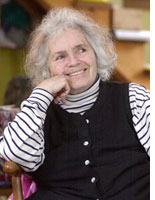Clifford Garstang's Blog, page 116
November 29, 2011
Interview with Kelly Kathleen Ferguson
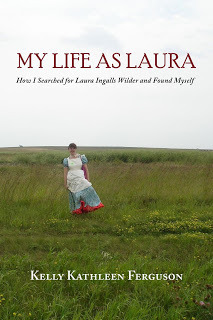
Kelly Kathleen Ferguson'sbook, My Life as Laura, was publishedtwo months ago by Press 53. Shortly thereafter, Ferguson posted an essay on theHunger Mountain blog about her experience with promoting the book: Being My Own Book Publicist. The essay is one of the most complete I've seen onthe subject of marketing, and well worth the read.
It begins: "Most writers I know have a distaste forself-promotion. Many of us have chosen to speak through the page for a reason.We want to be Oz, the Great and Terrible—but from behind the curtain. Iremember those MFA dreams of New York City publishers who would sweep me away.These creatures would care for my Art, and manage all that distasteful book-peddling."
Except it doesn't work out that way.
I thought it would be fun to follow up with Kelly, andthe result is this mini-interview:
CG: Kelly, your HungerMountain blog post was written in October. Your book has now been out fornearly two months. Have you learned any more about book marketing since then?
KKF: That it's freakingexhausting? I think of Little House in the Big Woods whereLaura and Mary would play with an inflated pig's bladder, batting it back andforth so it wouldn't touch the ground. My "internet presence" (quotes becauseit is so tenuous) requires constant maintenance. I blink and whatever momentumI've managed to gather goes splat.
I'm continuing to learn youcan't plan too far ahead for book reviews and readings. I thought I'd be out onthe road promoting before Christmas and I'm still putting events together. Igive myself a break in that with Press 53 I had no access to advance copies, sothat limited what I could set up ahead of time.
One tactic I've added is tobacktrack the press trails of authors working similar markets (Laura IngallsWilder books, for example). I Google to see where they are being reviewed andfollow suit. Kakutani of The New YorkTimes has yet to respond, but I have discovered some great blogs (such asthis one!) run by people who write back, even if they don't have time for areview. The online literary community runs deep. One book review blogger justnow let me know that while she might not get around to my book for threemonths, she sent me links to five other websites that might be interested.
I've also learned toinvestigate local writers' groups. A colleague of mine gave me a few contactsand I've set up two readings/craft talks. No, I'm not the keynote at Bread Loaf,but I can drive less than an hour, receive a little honorarium (usually$50-$100), and reach an interested audience.
CG: Specifically, have youexpanded your presence in independent bookstores? How's that working out?
KKF: Um, not so well. I'veadded one since that post. To be clear, it's not that bookstores are shootingme down (only one has said "no" so far). I haven't put much effort into asking.
It's weird because my dreamfor so long was to go into bookstores and see my book, but Press 53 doesn'tprovide distribution, so each and every placement is up to me. Every time Ihave to muster up this Oliver Twist plea, "Please sir, would you carry mybook?"
That being said, queryingindependent bookstores remains on my to do list.
CG: You mention the MontanaFestival of the Book in the blog post. Have you discovered other bookfestivals? And how does one find out about these things?
KKF: Basically, every stateand most major cities have a festival, so then it's a matter of targeting onethat might want you to present. No one has yet to contact me, as I'm notenough of a name. I have my MFA from Montana, so I had a personalconnection there, but I had to ask. I am going to try and query a few forthe future. (Again, remember that readers and presenters for these events areset up months in advance). For example, I'll try to present at the NorthCarolina Writers' Association Conference next year, since Press 53 runs a tableevery year and I lived in Durham for twenty years. My approach is to Google thefestival website, find the email of the coordinator, send a polite email inwhich I mention any relevant connections, and attach my book cover and pressrelease. It's worked once so far!
CG: Have you connected withbook clubs? How did that happen, and what was your experience? Is it somethingyou recommend?
KKF: If I could connectwith every book club ever I would do it. What's better than having a group ofpeople discuss your book? I mean, unless they are talking about how they didn'tcare for it. So far My Life as Laura has been the topic twobook clubs that I know of, both run by friends. I tried to Skype one but thatfailed so we had to go to speakerphone. Since my friend was there I feltnaturally gabby.
CG: Have you done jointappearances with other authors? Is that something you recommend?
KKF: I've run a fewreadings here at Ohio University that are just as much informal parties asanything else. I picked people who I know are good readers and who I couldtrust to keep it short. All it takes is one person who overstayshis or her stage time and the reading goes south. I've also been on a fewconference panels with literature scholars who presented their critical workand I read. I wish there were more collaborations like that.
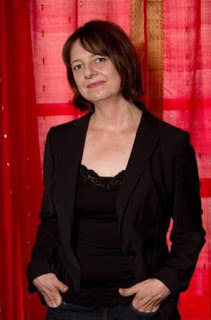 Come to think of it, mostof my readings have been with at least one other person. The obvious benefit isthat friends of all readers will attend. It also eases the pressure. There'sdefinitely a difference between being placed on a panel, versus organizing thereading yourself. I've been trying to put together an off site reading for AWPbut three people canceled and I'm about to give up. Joint appearances are justlike anything else involving other humans—amazing, frustrating, energizing,enervating, etc. I'm still new at this book promotion gig, but generallyspeaking I'm a people person, so in answer to the original question, yes, Irecommend reading with other authors.
Come to think of it, mostof my readings have been with at least one other person. The obvious benefit isthat friends of all readers will attend. It also eases the pressure. There'sdefinitely a difference between being placed on a panel, versus organizing thereading yourself. I've been trying to put together an off site reading for AWPbut three people canceled and I'm about to give up. Joint appearances are justlike anything else involving other humans—amazing, frustrating, energizing,enervating, etc. I'm still new at this book promotion gig, but generallyspeaking I'm a people person, so in answer to the original question, yes, Irecommend reading with other authors.CG: What's the single mostimportant thing you've learned about book marketing?
KKF: That every day isSadie Hawkins Day. (I trust dudes can translate the analogy). My fortune cookiewisdom is, "If you don't ask, you won't know, and have some treats handy forwhen you ask and they don't answer, or worse."
Published on November 29, 2011 05:01
November 27, 2011
VCCA: Mid-residency
 Mid-residency, already? Afraid so. I have only one more week.
Mid-residency, already? Afraid so. I have only one more week.I can't say that I've been terribly efficient, but then I'm floundering a little with the new work. I'm calling my output so far a "pre-draft"; it's not really a first draft since I'm still figuring out what the story is and who the characters are. But I'm nearly done with this first phase, and may begin writing the actual first draft tomorrow. That will take some time, of course, and I'll be lucky if I can finish a chapter or two by the time I leave next Sunday.
Since last I reported, we've had Thanksgiving. We had a wonderful dinner with turkey and stuffing and various veggies, plus pumpkin pie for dessert. Before dinner, the composer Andrea Clearfield was kind enough to play a selection of classical pieces (a little Brahms, a little Debussy, a little Bolling), and after dinner many of the writers did a "sampler" reading. We each read for about 5 minutes, which I thought was a great way to get a taste of what everyone is doing. Since my current work isn't ready for sharing, I read the prologue to the novel I recently finished. It only takes about four minutes, and I think gives a good sense of that book.
On Friday evening we had a reading by Shari Motro, a law professor at University of Richmond. She's working on a memoir and read a very personal section. (Not all memoirs are as personal, it seems to me.)
On Saturday night a bunch of the fellows went to Rapunzel's Coffee & Books for a presentation/puppet show by another of our fellows, Katherine Fahey, but I chose to stay in and work.
The weather has been great, although a bit too warm for this time of year. I wouldn't mind if the coming week turned cooler.
The picture above is from the woods on the grounds, although it's a picture I took last year. Haven't been doing much photography this year, but maybe I'll make up for that in the next few days.
Published on November 27, 2011 17:26
November 26, 2011
Holiday Deals: Books
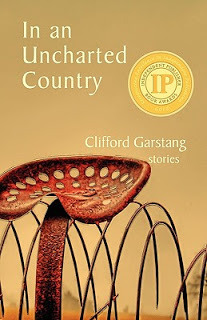 Press 53 has a great deal for you! Check out the Holiday Specials page on the website to see some terrific book bundles they've put together. For example, get 5 short story collections (one of which could be In an Uncharted Country, by me) for just $53. Or 3 story collections PLUS 3 poetry collections for just $53. And there are other bundles available, as well.
Press 53 has a great deal for you! Check out the Holiday Specials page on the website to see some terrific book bundles they've put together. For example, get 5 short story collections (one of which could be In an Uncharted Country, by me) for just $53. Or 3 story collections PLUS 3 poetry collections for just $53. And there are other bundles available, as well.Please take a look. There are some wonderful books included in this Holiday Special.
Published on November 26, 2011 05:27
November 25, 2011
Tips for Writers: Reading Aloud
 I'm at a residency this week at the Virginia Center for the Creative Arts and it provided the suggestion for today's tip, which is to read your work aloud.
I'm at a residency this week at the Virginia Center for the Creative Arts and it provided the suggestion for today's tip, which is to read your work aloud.There are several reasons to do this, applicable at different stages of the writing process. It is important to read your work aloud during the writing process. Writers who take language seriously must think about how words sound. It isn't enough to tell an exciting story. We must also be aware of the sounds of words, repetitions (intended and otherwise), and the rhythm of our sentences. Whether or not a reader will ultimately hear the words, these factors will affect the experience of reading them on the page, and we must take them into consideration. For me, that's part of the enjoyment of writing.
Then, at the proofreading stage, it's important to read work aloud because it helps to identify problems in punctuation, grammar, spelling, and other problems that might have been overlooked when the words on the page have become too familiar. I even advise composition students to do this--and these writers are little concerned with rhythm or euphony.
And then there is the stage when the work is being presented to the public, which happens frequently here at VCCA and also happens when writers are engaged in marketing the work. We often read the work aloud to an audience. And in that process, it's important read the work aloud in advance. To practice, in other words. the picture above is taken from a blog post called Reading Aloud Will Improve Your Delivery. And that's absolutely true. The readings here this week have mostly been very good. However, I've been to readings in the past that have been awful. (You might be interested in a short essay by Joe Mills on this subject: Dear Poet.) I once suggested to the director of a major writers' conference that he organize a seminar on giving public readings, but the idea was dismissed because, he said, "The work must exist on the page." Granted, of course. But then why do we give readings? And if we're going to give readings, we'd best not put our listeners to sleep.
Read your work aloud. It will help.
Published on November 25, 2011 17:37
November 23, 2011
VCCA: Residency Begins

I arrived at VCCA on Monday after several days at home oftrying to catch up on various other responsibilities. Since I hadn't beenwriting for that period, I struggled Monday afternoon to get back into theflow. But I did get some work done, and that felt good.
One of the great things—and one of the distractions—about beinghere, is that a few times a week we have presentations in the evenings by someof the residents. A fellow can skip them, which I do from time to time if I'mfeeling pressed, but on my first night, Monday, I wanted to attend.
Two artists presented. The first was Jenny Krasner whoshowed images she has created and also read from a long manuscript she'swritten about a trip to India she took recently. It's got a lot of humor and agreat voice, and it was fun to see the slide show of images at the same time asshe read the chapter from the book.
The second was Olive Ayhens, a painter who works inwatercolor and oil, and she showed slides of her work over a long period oftime, showing many influences andstyles, as well as the many locations in which she has worked—San Francisco,New York, Spain, Brittany, various National Parks, and elsewhere.
Tuesday was my first full day, and I felt like I got a lotdone, but in the evening I decided to keep going. I always feel bad aboutmissing a presentation, so I didn't hear Jerry Weinstein read, unfortunately.
Today, Wednesday, I got even more done, so this time Istayed in the residence for presentations by composer Andrea Clearfield, who played a work in progressbased on some extensive work she's been doing in the Tibetan region of NorthernNepal, and writer Katey Schultz who read some flash fiction and story from acollection she's working on about the wars in Iraq and Afghanistan.
It's all good, and we've got a special Thanksgiving presentationon tap for tomorrow, with a lot of people reading very short pieces.
Published on November 23, 2011 17:37
November 21, 2011
The New Yorker: "Leaving Maverly" by Alice Munro
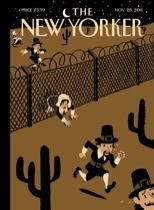
November 28, 2011: "Leaving Maverly" by Alice Munro
Maybe I'm just not in the mood for a Munro story, but thisone leaves me cold. Like many of her stories, this one covers several years—provingthat short stories don't have to focus on a short period of time. The problemwith trying to fit a long period of time into a short story, however, is thatit is difficult to achieve much depth. The reader is always skimming thesurface, it seems to me, and unless the occasional dips into the water aresustained, the author risks losing the reader altogether. Which, for me,happened here.
The story is about Ray, the night policeman in a small town,and a young girl, Leah. The girl is from a very strict household—one in whichthe wife and children aren't allowed to leave the house—but she is givenpermission by her father to take a job as ticket taker in a theater (as long asshe doesn't watch or even listen to the films). But she needs an escort to walkher home on Saturday nights, and Ray performs that duty. Ray, meanwhile, ismarried to Isabel, who left her husband to marry him. But she developspericarditis and is often too weak to do anything. When Leah disappears, Rayjoins the search, but the girl isn't found because, in fact, she ran off andmarried the minister's son.
And so on—Isabel gets sicker, Leah's marriage goes bad, andeventually, years later, they meet again in the hospital in another city. And maybe they'llget together, and maybe they won't, but I don't think I care. The story is so muchon the surface that I don't engage with any of the characters.
I'd be interested to know how others reacted to this one. I'ma fan of Munro, but not this story.
Published on November 21, 2011 04:33
November 19, 2011
Book Review: Dispatches from the Peninsula by Chris Tharp
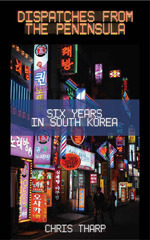
Dispatches From the Peninsula: Six Years In South Korea
Chris Tharp
Signal 8 Press, 2011
I arrived in Seoul, South Korea, in early January, 1976,half a year after graduating from college. To say that I didn't know what I wasgetting myself into would be an enormous understatement. But, to a largedegree, that was the point. I had joined the Peace Corps—taking a leave fromthe graduate school program that was, at best, a feeble attempt to forestallreal life. Like most Peace Corps Volunteers, I had mixed motives in signing up:I wanted to help people, sure; but I also wanted an adventure. I also didn'tknow what I wanted to be when I grew up, and I was buying time.
So we landed on a frigid morning, a group of twenty-five orso volunteers destined to work in "Higher Education English," meaning that wewould be teaching English as a Second Language to college students, most ofwhom were enrolled in English Education programs in their universities andcolleges. Like my fellow volunteers, I knew no Korean, knew little about Korea,and had no teaching experience. Peace Corps remedied that with two months ofintensive training—a full morning of Korean language studies in small groups(not to mention the language learning that occurred in the family homes thathosted us), and afternoons of lessons in both Korean culture and history andthe rudiments of Teaching English to Speakers of Other Languages (TESOL). Bythe end of training, we were ready to head to our duty stations, in my case aprovincial capital a hundred miles or so south of Seoul, into situations wherethere were no other foreigners and where English-speakers were few.
While the experience was not uniformly positive, those twoyears of Peace Corps service were extraordinary, and have shaped just abouteverything I have done since. They taught me about poverty, since Korea in the ´70swas still a very poor country. They taught me to cope with hardship. They alsoinstilled me with an indelible fondness for Korea, and in the 35 years since Icompleted my service I have been back many times for business and pleasure, including a wonderful tripearlier this year with other former Peace Corps Volunteers.
So I was pleased when the opportunity came up recently toreview Dispatches from the Peninsula: SixYears in South Korea by an American English teacher in Korea. I relishedthe chance to share another American's experience in Korea, updated by threedecades. And for the most part I wasn't disappointed. The writing is excellent,and the conversational tone is just right for this sort of memoir/travelogue. Plus,author Chris Tharp, as far as I can tell, gets the important stuff right—hisdigressions into Korean culture and history, his comments on contemporarypolitics and society, even his understanding of the Korean view of theircountry's place in the world today, seem to me to be spot on, and are probablyenlightening to readers who don't know the country. It's a fun read.
If there is disappointment here, it stems from the author'slimited experience in the country. Yes, he's lived there six years, but heseems to have spent it almost entirely in Pusan (hanging out with other expats),with only brief forays into the surrounding countryside. His time spent withKoreans outside of the classroom seems to be confined to drinking sessions (orover-drinking sessions), which he seems to believe is the national pastime, anda succession of girlfriends. And there are omissions that I think might havepresented a more complete picture of life in the Land of Morning Calm. Tharp sayshe doesn't like visiting Buddhist Temples, but Buddhism has had an importantimpact on Korea, as have both animist religions and Christianity, bothmentioned only in passing. Tharp addresses anti-Americanism but doesn't discussthe role that the stationing of 30,000 American troops (42,000 when I livedthere) on the peninsula has played in that sentiment. (In fairness, he doesmention one incident involving an American soldier that inflamed public opinion,but the tensions run much deeper.) And while Tharp does talk about someregional rivalries in Korea, he doesn't mention that these rivalries have theirroots in the warring kingdoms that arose two thousand years ago, which alsohelps to put the separation of North and South Korea in context.
Tharp is part of what we might call the Anti-Peace Corps,the cadre of young native-English speakers drawn from all over the world who havedescended on Korea to fill the demand for English teachers. In the ´70s, thePeace Corps met some of that demand at very little cost to the Koreans. But thePeace Corps left Korea in the ´80s—after the country reached middle-income status—andnow the country can afford to hire people to come teach. Unlike Peace CorpsVolunteers, these teachers generally receive no training—not in teachingtechniques, not in Korean culture, and not in Korean language. With littlepreparation in cultural sensitivity, it is no surprise when these foreignersclash with their hosts, such as the numerous incidents Tharp recounts in Dispatches.
But I don't mean to be overly harsh, and I readily admitthat some of my criticism is the result of my nostalgia for a Korea that isthese days hard to find. In fact, I enjoyed Dispatchesvery much, and appreciated Tharp's growth over the period described in thebook. In the sections covering his early days in the country, Tharp is condescendingtoward Koreans (in the tradition of Paul Theroux—a former Peace Corps Volunteer—whonever met a local he couldn't make fun of). But over time, it's clear thatTharp's affection for Korea and his understanding of the country have grown, sothat in the later sections of the book the self-portrait is of a man who ismuch more in tune with his surroundings. I also was touched by Tharp's accountof the loss of both his mother and father while living abroad (which closelyparalleled the deaths of both of my parents while I lived in Singapore in the´80s and early ´90s), and the challenges of being so distant from family. Ialso could relate to Tharp's experience in other ways, including his love ofKorean food and his struggles with the Korean language.
If you're considering teaching English abroad, of if you'rejust interested in what life is like for a foreigner in Korea, read this book.
Published on November 19, 2011 04:35
November 18, 2011
Book Review: Dakota, or What's a Heaven For, by Brenda Marshall
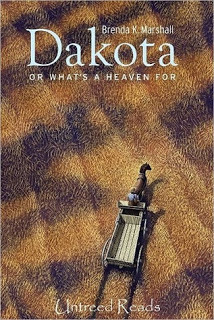
Dakota, or What's a Heaven For
Brenda K. Marshall
North Dakota Institute for Regional Studies, 2010
What to make of an old-fashioned telling of a thoroughlymodern story? Brenda Marshall's Dakotamay put off some impatient readers by following certain literary conventions ofthe time about which she is writing (the 1870s)—chapter headings describe whatwill happen in that chapter, for example, and rich exposition helps completethe portrait of the people and landscape of the Dakota Territory—butpersistence will be rewarded. This novel tells a surprising and a compelling storythat you haven't heard before, and it's filled with extraordinarily complex andmemorable characters.
The "Pre-Amble" offers clues as to what the book is about:it's a story of independence. "That narrative of independence remains aspowerful, as false, as necessary as ever in the Dakotas. It has become ourfetish, replacing the lost object of desire, the impossible place that neverwas. You have been told that there is nothing there. I tell you there is toomuch. Even where there is nothing, there is too much of it." This prologue alsogives us a list of the various narrative voices the reader will meet, includingthe book's dominant voice, that of Frances Bingham: "I mean for this to be mystory. It, too, is a story of what a woman's patience can endure, as well as ofwhat a woman's resolution can achieve."
This Frances has married one Percy Bingham in order to benear his sister, Anna, the true object of Frances's desire. Percy, however, isno great catch, although his lack of ambition means that proximity to Anna issecured, even when the family moves from St. Paul to the "Bonanza Farm" ofPercy and Anna's father, John Bingham, who has acquired his stake through hisconnections to the Northern Pacific Railroad. It is there, on the farm, thatFrances discovers her independence, and allows herself to pursue her "object ofdesire." But it is the 1870s, and nothing is very simple. As a woman, one whois more competent than any of the men around her, she cannot easily strike outon her own. She is a wife and is herself an object, no matter how she wouldlike to be defined. When she is rebuffed by Anna, she is reluctant to act whena new desire emerges.
Life is hard in the Dakota Territory, and not just forFrances. Blizzards seem endless, and are followed almost invariably by floodingand disease. Alcoholism is not unusual, and there are other addictions as well.One of the most memorable characters in the book is Little Carl, who harbors ashocking secret. There is also Jack Shaw, a Russian Jew who abandons the swamp landhis community bought, believing the marketing hype about the golden prairie.There is manipulative J.B. Power, an executive of the Northern PacificRailroad, the driving force behind the settlement of the territory. There isAlexander McKenzie, the scheming businessman who bends everyone, includingpoliticians and businesspeople, to his will, who has his sights set on Frances.And there is sweet Kirsten, the Norwegian girl who learns, even better thanFrances, how to survive on her own.
Frances, though, is the heart of the story. And while thereader's sympathy is often with her as she battles her drunkard husband, as sheseeks recognition for her skills, as she tries to do right by herless-fortunate neighbors, as she copes with her own desires, her struggle forindependence reveals her imperfections. She is, ultimately, selfish, and forthat she pays a high price—and learns a very hard lesson.
But the book is also a story of the Dakota Territory, andthe author's command of its history is truly impressive. It's well worthreading.
Published on November 18, 2011 09:05
Tips for Writers: The Cover Letter
 Some writers confuse cover letters with query letters.Indeed, there may be some overlap between the two, and their purposes aresimilar, but they are different beasts. I'll deal with query letters anothertime, but in short they are letters sent to agents or editors in which a bookis described and supporting information (bio and publication credits) isprovided. (There are other sorts of queries as well—following up on a previoussubmission, or putting forth an idea for an article or other project.) Thepurpose of the query letter is to get the agent or editor to ask to see thebook manuscript or proposal, and to that end it must include a compellingsynopsis of the material. Query letter writing is almost an art unto itself.
Some writers confuse cover letters with query letters.Indeed, there may be some overlap between the two, and their purposes aresimilar, but they are different beasts. I'll deal with query letters anothertime, but in short they are letters sent to agents or editors in which a bookis described and supporting information (bio and publication credits) isprovided. (There are other sorts of queries as well—following up on a previoussubmission, or putting forth an idea for an article or other project.) Thepurpose of the query letter is to get the agent or editor to ask to see thebook manuscript or proposal, and to that end it must include a compellingsynopsis of the material. Query letter writing is almost an art unto itself.A cover letter, on the other hand, is much morestraightforward. As the name suggests, it is the letter that is included withshort work—a short story, an essay, or a poem, for example—that is beingsubmitted for consideration by a magazine. The purpose is to get the magazineto read the material, but in this case that material is already in the hands ofthe magazine. There is no need, therefore, to describe it or summarize it inany way. In fact, most magazine editors will be put off if you do that. The'll be especially put off if you say how wonderful it is, or how wonderful someone else thinks it is. With short work, the writing stands on its own. All youhave to do is name the piece being submitted, provide a brief biography, andlist publication credits (or other relevant credentials). (Some cover lettersare simply transmittal letters, accompanying work that has already beenrequested, in which case the bio and credits can be omitted.)
The cover letter would look something like this [Note:letterhead includes contact information including phone and email, but if this is going by email then I add that following the signature]:
November 18, 2011
Ronald Spatz, Editor
Alaska Quarterly Review
Universityof Alaska Anchorage
3211 Providence Drive (ESH 208)
Anchorage, AK 99508
Dear Ronald Spatz,
I am submitting this story for yourconsideration. I would welcome any response you may have to "The Nations ofWitness."
My short story collection, In an Uncharted Country, was publishedin September 2009 by Press 53 and my novel in stories, What the Zhang Boys Know, is forthcoming in 2012. My work has alsoappeared or is forthcoming in BellevueLiterary Review, Blackbird, Cream City Review, Virginia Quarterly Review, and elsewhere. I hold a J.D. and an M.A.in English from Indiana University and an M.F.A. in Fiction from QueensUniversity of Charlotte. I have received fellowships to the Sewanee Writers'Conference and the Virginia Center for the Creative Arts.
Thank you for your time andconsideration. I look forward to hearing from you.Sincerely,Clifford Garstang
Simple, straightforward, businesslike. And the same lettercan be used with email and online submission managers.
A few things to note:· Do not summarize or comment about the work beingsubmitted.
· Do not include every publication credit youhave. Pick the best ones. Here's a note from Writer's Relief that may help youdecide which credits to include: "From Best to the Not so Best". As thatarticle emphasizes, not all publication credits are equal.
· Include only the relevant biographical details.Frankly, I should leave out my JD in the above cover letter unless I'msubmitting to one of the few literary journals that is connected to a lawschool. But I do think it says something about my general level of education,so I leave it in. What is relevant may depend on the publication you aresubmitting to. On the other hand, if something shows your seriousness as awriter—attendance at a writers' conference or a fellowship to a writers'retreat,for example—that should be included.
· Do not invite the recipient to visit yourwebsite for more information. It's okay to include your web address, but theeditor won't generally want to take the time to check.
· Address the letter in accordance with themagazine's guidelines. It is generally best to use the name of the actual personwhose attention you want, even if you realize the letter will be opened andread by someone else (an intern, a managing editor, or whoever). I don't thinkmost editors are terribly offended if the letter is addressed to the Editor, orthe Fiction Editor, instead of to a name, however. At least I'm not, andotherwise I'm pretty easy to offend, so I assume this isn't a big deal.
· Keep it simple and short. Never more than onepage. The idea is get the editor to read the story or essay or poem, not theletter.
Published on November 18, 2011 08:49
November 17, 2011
Grace Paley: Collected Shorts (the film)
Published on November 17, 2011 15:03

